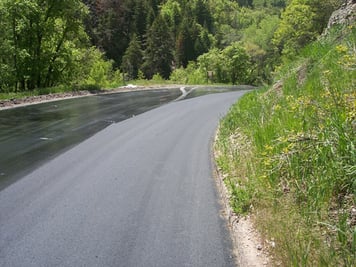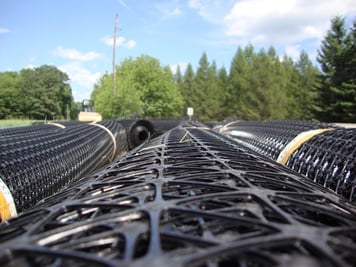Get Your Paving Done on Time and Under Budget with Tensar Products
- Home
- Team EJP Blog
- Get Your Paving Done on Time and Under Budget with Tensar Products
- Aug 9, 2016 7:39:51 AM
- Everett J. Prescott
When you have a paving job that needs to get done, it's easy for it to either get delayed or go over budget. How do you get the job done effectively and efficiently? One option that many contractors are putting into effect are the stabilization and paving products from Tensar. Two of the most popular products they offer is GlasGrid and Geogrids. Let's take a solid look at each product and what their advantages and disadvantages are for your situation.
GlasGrid

GlasGrid is an asphalt reinforcing system made of fiberglass strands that have been coated using an elastomeric polymer in a grid structure. Every strand in the system has a very high tensile strength combined with high amounts of elasticity. Because asphalt tends to crack at low strains and deform in extreme heat, GlasGrid helps ensure that the asphalt stays in place, creating a longer lasting surface on the road. This means you don't have to spend as much time and money making repairs to your road way or parking lot.
Glasgrid is applied by sandwiching it in between the surface course and the leveling course in an asphalt overlay system. This creates additional strength in the road way or parking lot, because vertical crack stress is moved horizontally through the system to dissipate those stressors. Because it's laid down with a pressure set adhesive on the bottom, it's one of the fastest reinforcement systems to lay down, at an incredible 25,000 square yards per day using an average lay down machine. The material quickly adapts to special installation circumstances or local weather conditions. Even while providing exceptional strength, it can still be readily milled and used in recycled asphalt pavement operations.
Geogrids
Geogrids provide mechanical stabilization for your road beds and paved areas, helping prevent slowdowns on the job site during wet weather and when working on unstable soils. Available in Uniaxal, Biaxal and Triax formulations, these mechanical stabilization materials handle everything from bank and slope stabilization to high traffic areas and everything in between. They perform very well, resisting breaking down even in soil pH as high as 12.

Uniaxal provides slope stabilization and grade separation using high-strength high-density polyethylene (HDPE) resins. The fiber is oriented to prevent or reduce creep, even when under heavy loads for long periods of time. Biaxal works well with work platform and road stabilization, and is well known as being the original mechanical stabilization grid. Triax, the latest offering from the company, provides superior superior stabilization using triangular geometry. This Geogrid is assembled by punching triangles out of multiple orientation polypropylene sheeting. This manufacturing technique allows higher radial stiffness through the full range of degrees. It also provides better rib and junction geometry as an improved alternative to traditional methods and materials. The structure also allows for good load transference from the geogrid to the aggregate.
Which of these products will work best for your situation? You or your contractor can best determine that. But for either situation, these high-quality Tensar products provide durable solutions to get the job done on time and on budget. If you need help finding the perfect paving solution for your project, Team EJP is here to help. Just contact us today and we'll help you get your project moving quickly and at the right cost.
Photo Credit: Tensar








